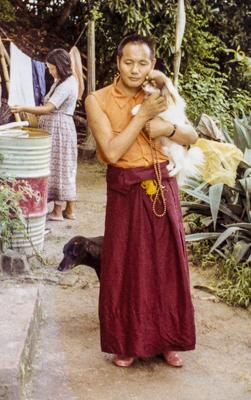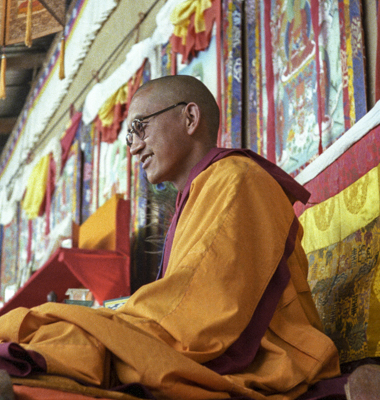Dear Friends,
Welcome to the March issue of our monthly e-letter. We hope you enjoy reading updates of our latest work that we undertake together, for the benefit of all beings everywhere. Please share!
The LYWA Podcast: Why Are There So Many Different Buddhas?
With ignorant mind you cannot approach the omniscient mind. Like without the fuel in the car you cannot reach your destination. Even if you have the car, if you don't have the fuel then you cannot reach to the desirable place.-Lama Zopa Rinpoche
This month on the LYWA podcast, Lama Zopa Rinpoche explains why we work with so many different aspects of the Buddha during our practice. By taking refuge in these varied aspects of the Buddha's enlightenment, we open ourselves to their particular attributes, guidance and inspiration. For example, cultivating a relationship with Manjushri creates the conditions to increase our wisdom-knowledge and with White Tara we can increase the span of our perfect human rebirth. Cultivating the appropriate conditions helps us overcome our personal karmic obstacles on the path to enlightenment for the benefit of others. Rinpoche gave these teachings at the Fourteenth Kopan Meditation Course in 1981. You can read along with the transcript here.
The LYWA podcast contains hundreds of hours of audio, each with links to the accompanying lightly edited transcripts. See the LYWA podcast page to search or browse the entire collection by topic or date, and for easy instructions on how to subscribe.
NEW TO THE VIDEO ARCHIVE: When the Bush Starts Moving
This month's video offering is a recent talk given by Tenzin Ösel Hita in December 2018 at Institut Vajra Yogini in France. Venerable Robina Courtin was visiting Institut Vajra Yogini to give teachings to the fortunate students. One day she asked Ösel, who was present in the assembly, to give a Dharma talk to the assembled students. Osel then muses on a wide range of topics suggested by the students, including education, masculinity, patience, the fear of loss, frustration and jealousy, the importance of discipline, attachment to things and people, how to spot and avert anger before it ambushes us, the power of compulsions, the joy of love and the importance of intention. You can learn more about Tenzin Ösel Hita by reading his biography on our website.
Visit and subscribe to the LYWA YouTube channel to view dozens more freely available videos from our archive.
WHAT'S NEW ON OUR WEBSITE
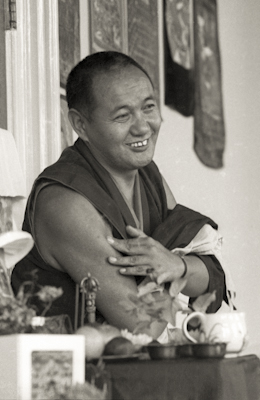 Recently posted to our website is Monsters (Un)Incorporated, a teaching on meditation experience by Lama Yeshe. Excerpted from The Yoga Method of Divine Wisdom Manjushri, a commentary given by Lama Yeshe at Manjushri Institute, Cumbria, England, in July–August 1977. Edited by Nicholas Ribush and published in Mandala magazine, February 2006.
Recently posted to our website is Monsters (Un)Incorporated, a teaching on meditation experience by Lama Yeshe. Excerpted from The Yoga Method of Divine Wisdom Manjushri, a commentary given by Lama Yeshe at Manjushri Institute, Cumbria, England, in July–August 1977. Edited by Nicholas Ribush and published in Mandala magazine, February 2006.
This month's new additions to Lama Zopa Rinpoche's Online Advice Book include:
- Ultimate Advice for Success: Rinpoche gave this advice on the most powerful way to collect merit to a student who had asked about her daughter and about a practice to improve her own financial situation.
- Numberless Buddhas Cherish You Most: A student’s mother had cancer and the student was feeling depressed, isolated and alone.
- Purifying the Karma of Disrespecting a Friend: A student wrote that he had belittled a friend and Dharma brother. He had already applied the four opponent powers, but asked if there was anything else he could do to purify and restore his vows.
- The Karma of Harming Others: This advice was given to a student who was experiencing many obstacles, was dealing with angry people and had debilitating depression.
On our website, you can always find a list of all the newly-posted advices from Lama Zopa Rinpoche.
New Russian Translation
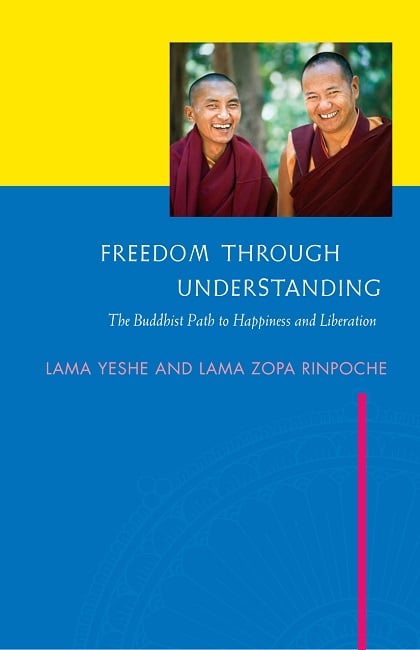 Freedom Through Understanding by Lama Thubten Yeshe and Lama Zopa Rinpoche is now available in Russian. Translated by Anastasia Stoliarova. These teachings were given at a weekend seminar on the lamas' first trip to Europe in 1975. The teachings encompass the entire Buddhist path to enlightenment, including the purpose of meditation, bodhicitta, the importance of motivation, tonglen and the shortcomings of attachment, among other topics. You can download the PDF and find more Russian translations here on our website.
Freedom Through Understanding by Lama Thubten Yeshe and Lama Zopa Rinpoche is now available in Russian. Translated by Anastasia Stoliarova. These teachings were given at a weekend seminar on the lamas' first trip to Europe in 1975. The teachings encompass the entire Buddhist path to enlightenment, including the purpose of meditation, bodhicitta, the importance of motivation, tonglen and the shortcomings of attachment, among other topics. You can download the PDF and find more Russian translations here on our website.
We are grateful to work with so many amazing translators who make our publications and transcripts available in languages other than English. Please see our website for links to translations in sixteen languages.
BIG LOVE UPDATE
Much love,

Nick Ribush
Director
This Month's Teaching: The Enlightenment Attitude
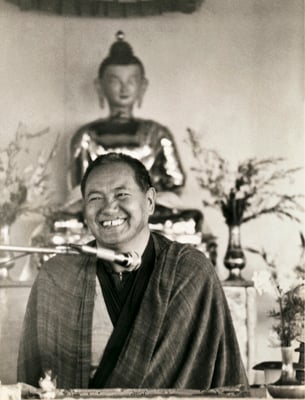 The thing is, from the Buddhist point of view, it is very important for one to have the enlightenment attitude. It is an important thing. The reason is, I think I can say, that without some kind of attitude or thought with which to transform the actions of our daily life, life seems to be a disaster. If you are living in a couple relationship, or even if you are just a single person, you still have to relate with human beings. Even if you go into the Himalaya Mountains, you still have to relate with sentient beings, human beings. There is no place that you can go where you don’t have to relate with human beings, so it is very important to have this attitude, because all actions, both good and bad, depend on it. You know—I’m not going to tell you that, you know already. So in order to transform our lives, to live in the best way, we desperately need to constantly have the divine quality enlightenment attitude, bodhicitta.
The thing is, from the Buddhist point of view, it is very important for one to have the enlightenment attitude. It is an important thing. The reason is, I think I can say, that without some kind of attitude or thought with which to transform the actions of our daily life, life seems to be a disaster. If you are living in a couple relationship, or even if you are just a single person, you still have to relate with human beings. Even if you go into the Himalaya Mountains, you still have to relate with sentient beings, human beings. There is no place that you can go where you don’t have to relate with human beings, so it is very important to have this attitude, because all actions, both good and bad, depend on it. You know—I’m not going to tell you that, you know already. So in order to transform our lives, to live in the best way, we desperately need to constantly have the divine quality enlightenment attitude, bodhicitta.
Anyway, the attitude is so important. We always say, “profound life,” don’t we, in the West? We do say, everybody uses the words, “profound life.” Profound life means profound meaning, profound destination, or profound aim. The reason that we human beings are bored with each other is that we don’t have a profound destination. We shake hands with each other and that is it, that is the aim, our aim is finished. Then we are bored. We can’t see that besides shaking hands there is some profound meaning and reality, we can’t see. That is what’s wrong. Really, the point is that we Westerners should live as much as we can by taking what life and society offer. You should have a comfortable life, you can do that, you can take that advantage, you can use that. But at the same time, you should know that sense pleasures and comfort of this life are not the only things to live for. We can do better, better. Each day we can live a better life. It doesn’t matter whether I’m young or stupid or old at the moment. Still my potential for a joyful life can grow infinitely.
Also, you understand the characteristic of the bodhicitta attitude is that one is not concerned with the comfort of only one’s own life; moreover, one is not only concerned with one’s own liberation. One sees or recognizes that the potential for everlasting peace and the blissful state exists within all of the universal sentient beings. Last, one takes the responsibility of leading all these sentient beings and fertilizing their potential—taking the responsibility all by oneself. This attitude is very important.
For example, often we have friends. Sometimes your friend might say, “This time I need somebody to do this.” He expresses a need for something, some help from you. He doesn’t ask in a heavy way, and our self-cherishing thought doesn’t have room or sensitive awareness or understanding to take that vibration into our mind. We are already blocked. You see, the human psychology is that really, if you have not prepared yourself in such a way, even when your friend expresses his need to you like this you just ignore it. You can see, your friend is not stupid. He knows, “I tried to express myself in such a way but look, he never heard, it never went into his mind.” Unbelievable, that’s the way it goes. I think we all do this. It’s not so good, is it?
You have a relationship with another person, and sometimes that person really gives their life, their energy, everything to you for such a long time. And when he has a difficult time and expresses his need in a very gentle way, your concrete mind is so strong that it never occurs to you that he needs something. It just goes off from here. Can you imagine? I mean the other person is going to be hurt, isn’t he? That means you have no preparation; you have no foundation to receive, you have already rejected, “Urrr,” you have already built a wall. Or maybe as Westerners say, the door is already closed. So there’s no room. That is the way human problems and conflict come.
Then the next day perhaps intellectually you say to your friend, “Wow, can I do something for you?” And he thinks, “Forget it. Yesterday I told you so many times that I needed help and you didn’t pay any attention. Today you are just saying, ‘Hello, can I help you. Do you want something from me now?’” It’s true, completely true. You see, this is the way all the human conflict comes. Some reason, incredible. I tell you, that takes tremendous energy. Just to hear, let alone your sharing. Some reason, I don’t understand human beings; just to hear, just to be receptive is difficult, let alone saying, “Oh, you have this problem; I’m sorry, I have compassion.” Even though these things are not new, still, to be kind of sympathetic also takes time. It takes time, we are just like stone, so much like stone; no response to the needs of any humans or other sentient beings. That is the problem. So in human relationships it is very important to be open to each other, sort of willing, determined, wanting to help each other. If you determine in that way, then there is room for the gross information to come in through here to here. [Lama points at his ear then his heart.]
So, the Tibetan yogi, Lama Je Tsongkhapa said that the enlightenment attitude, bodhicitta, is the essence of the Mahayana vehicle and it is also the foundation of development of the six paramitas and the ten bodhisattva bhumis. It is also like alchemy, the energy that has the ability to transform iron into gold. Similarly, by having the enlightenment attitude, it is possible to transform our mundane Western life into the transcendental bodhicitta path to enlightenment, the path to enlightenment. It is possible.
This excerpt is from a teaching by Lama Yeshe about the importance of bodhicitta, the mind of enlightenment. The teaching was given at Chenrezig Institute, Australia, on September 14, 1979, when Lama was bestowing bodhisattva vows. Lightly edited by Nicholas Ribush. You can find it here on our website.























